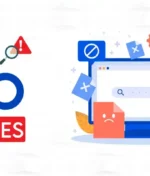
Common PPC Mistakes and How to Avoid Them

Pay-per-click (PPC) advertising is a powerful marketing tool that can drive traffic to your website, increase brand awareness, and ultimately boost sales. However, if not properly executed, PPC campaigns can waste your budget and hinder your business’s growth. Many businesses make common PPC mistakes that can significantly impact their ROI (return on investment). In this blog, we’ll explore the most frequent PPC mistakes and provide strategies on how to avoid them to ensure your campaigns are successful.
1. Not Defining Clear Goals
One of the most significant mistakes businesses make when running PPC campaigns is not setting clear goals. Before launching any PPC campaign, you need to establish specific, measurable objectives. Whether your goal is to increase website traffic, generate leads, or boost sales, your strategy should be aligned with these objectives.
Why It’s a Mistake:
Without clear goals, it’s difficult to measure the success of your campaigns. This lack of direction can lead to wasted ad spend, irrelevant targeting, and an overall lack of results.
How to Avoid This Mistake:
Before creating any PPC ads, define your goals. Ask yourself: What are you trying to achieve? Who is your target audience? What actions do you want your audience to take? Once you have these answers, ensure that your ads, keywords, and landing pages are all aligned with your objectives. For example, if your goal is to generate leads, your PPC ads should include a strong call-to-action that directs users to a lead capture form.
2. Poor Keyword Selection
Selecting the wrong keywords is another critical mistake in PPC campaigns. Keywords are the foundation of your PPC ads, and targeting the right ones is crucial for attracting the right audience. Many businesses either overestimate the importance of highly competitive keywords or fail to research their keywords thoroughly.
Why It’s a Mistake:
Targeting broad or overly competitive keywords can drain your budget without delivering quality traffic. On the other hand, not using the right long-tail or niche keywords can result in lower click-through rates (CTR) and fewer conversions.
How to Avoid This Mistake:
Do thorough keyword research before launching your PPC campaign. Use keyword research tools like Google Keyword Planner or SEMrush to identify relevant and high-converting keywords for your business. Focus on a mix of broad, exact, and long-tail keywords to capture both general and specific search queries. Don’t forget to include negative keywords to filter out irrelevant traffic.
3. Not Optimizing Landing Pages
Your PPC ads are only as good as the landing pages they lead to. If your landing page doesn’t provide a clear message or fails to load quickly, you’ll likely lose potential customers. A common mistake is sending PPC traffic to your homepage or an unrelated page instead of a dedicated, optimized landing page.
Why It’s a Mistake:
If your landing page doesn’t match the ad’s promise or doesn’t provide a clear path to conversion, users are more likely to bounce, and your ad spend will be wasted.
How to Avoid This Mistake:
Ensure that your landing pages are highly relevant to the ads you are running. If you’re advertising a specific product, the landing page should showcase that product with relevant content, images, and a clear call to action. Additionally, make sure your landing pages load quickly and are optimized for mobile devices, as poor user experience can lead to high bounce rates.
4. Ignoring Mobile Optimization
In today’s digital world, mobile devices account for a large portion of internet traffic. Yet, many businesses still neglect to optimize their PPC campaigns for mobile users. Failing to account for the growing number of mobile searches can significantly limit the effectiveness of your PPC campaign.
Why It’s a Mistake:
If your ads or landing pages aren’t optimized for mobile, users will have a frustrating experience, leading to a higher bounce rate and a lower conversion rate. Moreover, Google takes mobile optimization into account when ranking ads.
How to Avoid This Mistake:
Ensure that your PPC ads, landing pages, and overall website are mobile-friendly. Your landing pages should load quickly and display correctly on smaller screens. Google Ads allows you to monitor mobile performance separately, so keep an eye on these metrics and optimize accordingly.
5. Not Using A/B Testing
A/B testing, or split testing, is the process of testing different versions of your ads, keywords, and landing pages to see which ones perform better. Many businesses fail to run A/B tests, sticking with the same ad copy and settings throughout the campaign.
Why It’s a Mistake:
By not testing different elements of your campaign, you miss out on opportunities to optimize your ads for better performance. Even small tweaks can result in significant improvements in your CTR and conversion rates.
How to Avoid This Mistake:
Regularly test different variations of your ads, including headlines, calls to action, and display URLs. You can also test different landing page designs and content to see which resonates best with your audience. Use the results of your A/B tests to refine your PPC campaigns for better performance.
6. Setting and Forgetting Campaigns
One of the biggest mistakes in PPC is setting up campaigns and then leaving them to run without monitoring or optimization. While PPC ads can deliver immediate results, they also require ongoing attention to ensure they remain effective.
Why It’s a Mistake:
Without monitoring and optimizing your campaigns, you may miss opportunities to reduce costs, improve performance, or adjust targeting based on new trends or insights. Your competitors may also change their strategies, affecting your campaign’s performance.
How to Avoid This Mistake:
Regularly monitor your PPC campaigns and adjust settings as needed. Review your keyword performance, ad copy effectiveness, and conversion rates. Make changes based on what’s working and what’s not. For example, pause keywords that aren’t converting, or test new ad copy to see if it performs better.
7. Overlooking Ad Extensions
Ad extensions are additional information that can be added to your PPC ads, such as phone numbers, location, site links, and more. Some businesses overlook the potential benefits of ad extensions, resulting in missed opportunities to engage users.
Why It’s a Mistake:
By not utilizing ad extensions, you’re missing a chance to provide users with more information and increase your ad’s visibility. Ad extensions can improve CTR and provide valuable information without the need to click on the ad.
How to Avoid This Mistake:
Take advantage of all the ad extensions available in Google Ads and other platforms. Use sitelink extensions to provide direct links to relevant pages, call extensions to enable users to call you directly, and location extensions to help local users find your business. These simple additions can significantly improve your ad performance.
8. Failing to Track Conversions
Tracking conversions is essential to understanding how well your PPC campaigns are performing. Many businesses fail to set up proper conversion tracking or fail to track the right actions, such as form submissions or product purchases.
Why It’s a Mistake:
Without conversion tracking, you won’t be able to measure the effectiveness of your ads. You may be spending money on clicks that don’t result in valuable actions, leading to poor ROI.
How to Avoid This Mistake:
Set up conversion tracking using tools like Google Ads conversion tracking or Google Analytics. Track key actions, such as purchases, sign-ups, or inquiries, to determine which ads and keywords are driving the most valuable traffic. Use this data to optimize your campaigns and focus on what drives results.
Conclusion
PPC advertising can be a highly effective way to drive traffic and generate leads, but common mistakes can quickly drain your budget if not avoided. From not defining clear goals and poor keyword selection to neglecting mobile optimization and A/B testing, each of these mistakes can hinder the success of your campaigns. By staying on top of your PPC campaigns, regularly testing new strategies, and carefully monitoring performance, you can maximize your ROI and avoid wasting valuable ad spend. Take the time to plan, track, and optimize your campaigns, and watch your PPC success grow.












